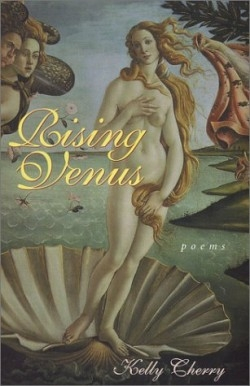Rising Venus
Poems
Having read this book, acclaimed poet and university lecturer David R. Slavitt calls the author “one of the best dozen or so poets writing in America. Here, she not only maintains but even surpasses her previous high level of achievement. Work like hers is nothing less than a national treasure.”
This is Cherry’s sixth collection of poetry, and her most extraordinary. The poems delve into women’s experience with poignancy, humor, and passion. While the poet’s persona may feel anguished or desperate, she continues to rise, like Venus, finding her destiny.
In the opening poem, “Adult Ed. 101: Basic Home Repair for Single Women,” the poet’s love for wordplay and pun is evident. In the first stanza, she enumerates what everyone needs in “the tool box,” including: “Hacksaw and coping saw (coping saw!) / caulking gun / screwdrivers (with orange juice).”
Blending memories of old lovers with household tasks as she learns to hang drywall, she wryly acknowledges: “Studs should be sixteen inches apart / but are often fewer and farther between / and let’s face it, you may have seen your last stud. / In that case, use an anchor / in plaster or drywall.”
The poem’s last stanza sets the book’s tone: “Ladies, you are about to find out / just how much really rough / weather / your house can take.”
Cherry is unafraid to confront emotional turbulence. In the title poem, the poet’s persona confronts her demons and realizes that: “Myth is the portal / through which we pass, / becoming human at last, / rising out of dreams / and desire to realms of reality, where love, / a woman, by Jove, / survives, strong and free, engendering her own destiny.”
Cherry explores the stages of a woman’s life as daughter, single woman, lover, wife, mother, working woman, mentor, and artist. The realization that she’s “Becoming My Mother” is universal: “And suddenly it’s her voice I’m speaking / with, it’s her look that’s in my eye, and I / can feel it there, as if her face were my / face, and even the gestures I am making / are ones that were characteristic of heró / an absent twisting of a strand of hair, / a hand across her mouth, a decided air / of disapproval or despair, whichever / she felt.” / But now I find myself becoming her; / childless though I am, my own mother.” In “An Other Woman” (first published as a chapbook), the poet explores women’s place in art, questioning whether women are meant to be muses or have muses, delving into how men, and society, look at women. She imagines “Sappho in Her Study,” “Virginia Woolf’s Last Suicide Note,” and “Lady Macbeth on the Psych Ward.” “She Doesn’t Care What You Say about Her So Long As You Spell Her Name Right” is a delightful play on what it means to be famous. The poem and poetic form wink at T.S. Eliot’s “The Love Song of J. Alfred Prufrock” as well as at pop culture.
In “Wishing I Could Bring You Back and See Things More Clearly This Time Around,” dedicated to Jonathan Silver, a sculptor and Cherry’s first husband, and in “To a Young Woman,” the book’s closing poem, she reminds readers how lovely both the elegy and the occasion poem can be. Incidentally, a sculpture by Silver graces the book’s title page.
As in her previous collections Lovers and Gnostics, Relativity, Natural Theology, God’s Loud Hand, and Death and Transfiguration the poet returns to the themes of living one’s life as an artist, particularly, a woman artist; the quest for love; philosophical observations on art, literature, myth, and history; and the descension into madness followed by the ascension into reality. While the author works in other forms, including fiction and memoir, she considers poetry to be at the center of all her work. Her use of tradition and context are fresh, original, and provocative. It’s hard to imagine not returning to the poems in this collection again and again for their beauty, honesty, and humanity.
Reviewed by
Pam Kingsbury
Disclosure: This article is not an endorsement, but a review. The publisher of this book provided free copies of the book to have their book reviewed by a professional reviewer. No fee was paid by the publisher for this review. Foreword Reviews only recommends books that we love. Foreword Magazine, Inc. is disclosing this in accordance with the Federal Trade Commission’s 16 CFR, Part 255.


